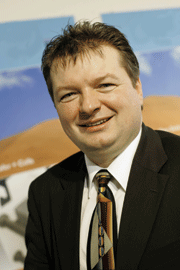E-Archive
Interview
in Vol. 10 - January Issue - Year 2009
Innovative Solutions for Surface Cleanliness in line with Demands

Karl-Heinz Menauer, Managing Director of acp GmbH
To achieve and document the required level of component cleanliness at cost-effective prices, acp GmbH supplies a range of innovative technologies. MFN spoke to Karl-Heinz Menauer, Managing Director of the company.
(?) MFN: acp – advanced clean production GmbH was founded in 1997 as a spin-off from the Fraunhofer Gesellschaft’s Institute for Manufacturing Engineering and Automation (IPA) with the aim of rapidly converting scientific concepts into economically-viable products. What areas does the current range of products cover?
(!) K-H. M.: With our CO2 snow jet technology, we provide a highly-efficient carbon dioxide cleaning process for the precision-cleaning and micro-cleaning of components and parts in an environmentally-neutral way. Recently, we also presented a new wet-cleaning technique. In addition to these, we have three different inspection systems, SurfSens, CombiSens and PartSens, for inspecting surfaces for filmy and particulate residual contamination. These devices ascertain the degree of cleanliness and document results in-line in a non-destructive manner. PartSens has a large sensing head for effectively inspecting large surface areas such as steel sheets for particulate contamination. Our range of products also includes micro-dispensing systems for filled and unfilled viscous media.
(?) MFN: Do you still collaborate with the Fraunhofer Institute?
(!) K-H. M.: Yes, we work together very closely with IPA. We design innovative products based on scientific concepts, inform them about market demands and give IPA ideas for research and development projects.
(?) MFN: You mentioned a new wet-cleaning technique. What is so special about it and where is it used?
(!) K-H. M.: The core of the process is constituted by a brand-new roller technology which has been developed by acp and is currently awaiting worldwide patenting. It enables large-sized substrates with heterogeneous structures to be processed and cleaned in-line. The machine is mainly utilised to treat crystalline solar cells and wafers in the photovoltaic and semiconductor industries but can also be used to advantage in the metal-processing industry.
(?) MFN: What advantages do they include?
(!) K-H. M.: One advantage is that an existing material flow doesn’t have to be interrupted for a cleaning process or to apply a homogeneous layer of liquid media. This means that parts no longer have to be transferred to goods carriers for a batch process, which in turn reduces the risk of damage. Additionally, the cleaning system only requires a minimum automation outlay and takes up very little space.
(?) MFN: acp supplies automated integrated solutions both for CO2 snow-jet cleaning and for the new wet-cleaning process from one source. How do you implement automation?
(!) K-H. M.: Here, acp works together with a subsidiary company called ACI-ecotec which specializes in automation technology.
(?) MFN: What fields is ACI-ecotec involved in?
(!) K-H. M.: One sector is photovoltaics where we develop back-end solutions for production lines for thin-film and crystalline modules. Contacting is our core competency and we develop turnkey solutions together with a range of partners. ACI-ecotec is also active in the automotive industry, designing and constructing customised automation solutions for various applications.
(?) MFN: Are there any other companies belonging to the concern?
(!) K-H. M.: There’s acp IT AG which designs software solutions for factories and also boraident which specializes in systems for marking glass and metals.
(?) MFN: Getting back to acp – advanced clean production, what are the aims for the next few years?
(!) K-H. M.: We’re working on establishing our CO2 snow-jet technology as a standard technique in various applications such as laser processing and coating pre-treatments where wet-chemical and mechanical cleaning processes are still being implemented. Because of its technical, ecological and economical advantages, we also want to make people more aware of the benefits of CO2 as a coolant in chipping processes. As far as our inspection systems are concerned, the aim is for them to replace the current traditional processes. And, of course, we’re planning to continue to develop new processes and technologies as well as improve existing ones.
We would like to thank Karl-Heinz Menauer for this interview.



























